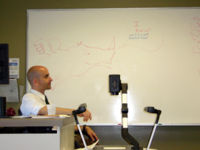Difference between revisions of "Logic: Principles of Reasoning"
Pink Lizzy (talk | contribs) |
|||
| Line 1: | Line 1: | ||
| − | {{CTY Courses | image = [[Image:littlelogc.jpg| | + | {{CTY Courses |
| + | | image = [[Image:littlelogc.jpg|200px]] | ||
| + | }} | ||
[[Logic: Principles of Reasoning]], commonly shortened to Logic, is a Humanities course in the CTY program with no prerequisites. Its course code is LOGC, and it is offered at [[Baltimore]], [[Lancaster]], [[Los Angeles]], and [[Saratoga Springs]], and was also offered at [[Loudonville]]. | [[Logic: Principles of Reasoning]], commonly shortened to Logic, is a Humanities course in the CTY program with no prerequisites. Its course code is LOGC, and it is offered at [[Baltimore]], [[Lancaster]], [[Los Angeles]], and [[Saratoga Springs]], and was also offered at [[Loudonville]]. | ||
Revision as of 14:02, 30 June 2010
Logic: Principles of Reasoning, commonly shortened to Logic, is a Humanities course in the CTY program with no prerequisites. Its course code is LOGC, and it is offered at Baltimore, Lancaster, Los Angeles, and Saratoga Springs, and was also offered at Loudonville.
Course Description
Logic: PoR, as opposed to Mathematical Logic, is a humanities course, centering on logical reasoning applied to writing and arguments. The main activities of the class usually include reading and discussing philosophy, debating (sometimes against Philosophy of Mind classes), and writing argumentative essays, with the main emphasis on making arguments logical and strong. Students in this class are also introduced to formal logic, at a level roughly equivalent to a college freshman-level course.
Class History
The CTY Logic course was designed and first taught by the great and honorable Jonathan Cohen in 1985 at Dickinson, and from 1986 to 1988 at Franklin and Marshall.
The Logic textbook generally remains the same through the years and is known to use odd analogies:
- "After taking LSD, Alice said she saw a flying saucer land in the parking lot of her local mall. Since Alice has a history of telling the truth, we can conclude that an alien spacecraft really did land in the parking lot." (LAN 05.2)
- "If there is nothing to fear but fear itself, then women should not fear serial rapists." (SAR 06.1)
- "On the evening of the fourth, Mr. Wilson went out onto the veranda to watch the fireworks go up in his pajamas. We therefore conclude that he had a very exciting evening." (LAN 06.2)
- "I saw you at that party the other night. Everyone there was doing crack. So tell me, how long have you been dealing?" (LAN 07.2)
- "Native Americans are disappearing. Ralph is a Native American. Therefore, Ralph is disappearing." (JHU 07.2)
- "So, how long have you been beating your wife for?" (JHU 07.2)
- "After high schools introduced SAT prep, SAT scores declined 10%. Therefore, we should eliminate high schools." (JHU 07.2)
- "If I cannot be killed by infinite ninjas, then I am alive after infinite ninjas killed me" (LMU 07)
- "If I open the door and bash this poor little kid's head in accidentally, should I go to jail?" (JHU 08.1)
LOGC.B.LAN.07.2 says:
- Intelligent design is a hamburger.
- God doesn't have to exist to not play dice.
- Kib's taters is holy.
- We don't believe in evolution.
- It's like finding ways to draw common sense.
- It's a vicious lack of cycle.
- Your mom's a fallacy!
- Enough said about Professor Conway...
LOGC.B.LAN.07.1 gossiped using formal logic while typing their dreaded opinion articles:
B ⊃ N/ B//N
F <3 L/L <3 E//F <3 E
(F <3 E) ⊃ (L ≡ JB)/F <3 E//L ≡ JB
[Note regarding validity of first statement: we proved that love is a transitive property (we being Emily, Larissa, and sort of Nixxi)]
LOGC.B.LAN.08.01 Quotes the unimitatable TA Charles
"LOOOGGIIC B!!!!!! LEEEEEEEEETT'S GOOOOOO"
THE POWER THAT IS THE CLOCK, AND ITS LOVER, ERIK!
LOGC.B.LAN.08.2 Continues to quote Charles:
"Ain't no power like the power of logic, 'cause the power of logic don't stop!" (say what?)
"Ain't no power like the power of logic, 'cause the power of logic don't stop!" (can't hear you!)
"Ain't no power like the power of logic, 'cause the power of logic don't stop!" (oh baby!)
"Ain't no power like the power of logic, 'cause the power of logic don't stop!"
At LOS, the Logic Instructor, Brian Talbot, is famed for his Logic call, used at handoffs. It is often imitated, but never duplicated: "LOOOOOOOOOOOOOOOOOOOOOO-(deep breath)-GIIIIIIIIIIIIIIIIIIIIIIC!" Every year, the Logic class also holds debates with the Ethics class. Ethics usually wins.
JHU Sesh 1 '08 Logic A taught by Bill McGeehan is known for its suggestiveness : B horseshoe J, PMS, and all those perverted contraception in schools/eugenics debates. This class also had a really cool TA Kurt Pfund, whom we all called Mr Tumnus because of his uncanny resemblance to McAvoy
LOU.08.1.LOGC, taught by Jim Davis (no relation to the cartoonist) and TA'd by Dan — later the TA for SAR.09.1.LOGC —, featured such memorable moments as
- Jim's divison of the class into the four Harry Potter houses.
- a debate over evolution's status as a scientific theory where the jury determined that evolution was, in fact, not a scientific theory.
- debates in groups with ETHC students first on capital punishment and then on human cloning (mostly uneventful), followed by a debate on the merits of pirates vs. ninjas.
- among many others.
SAR.09.01.LOGC.A Jim Davis is the best logic teacher in the world. He is the same Jim Davis who put his class into Harry Potter houses and switched them periodically. Harry Potter houses are groups of 2-3 people that work together during logic problems, and earn points for their house.
